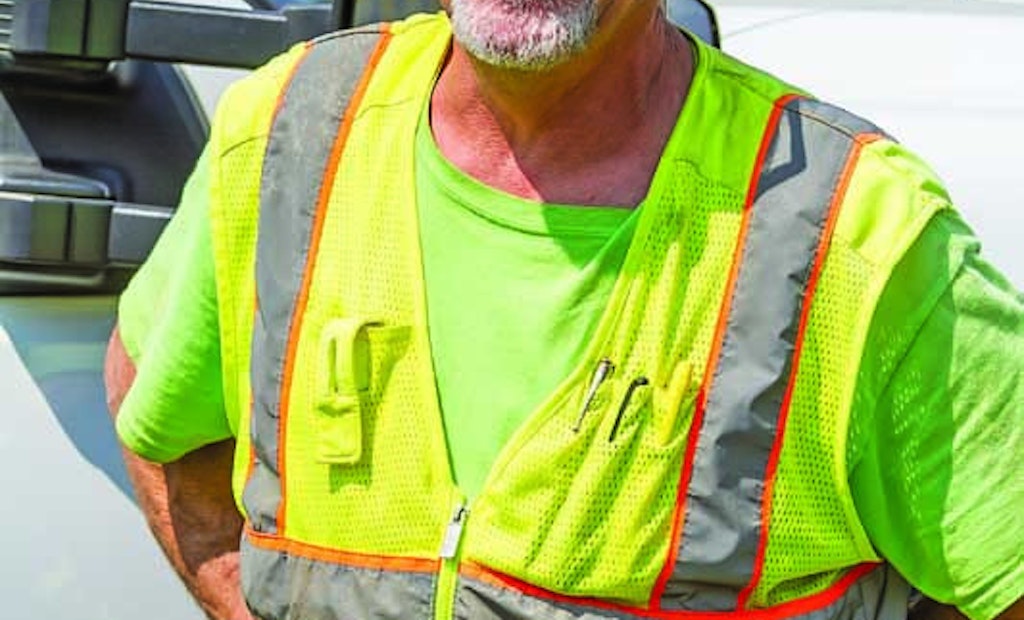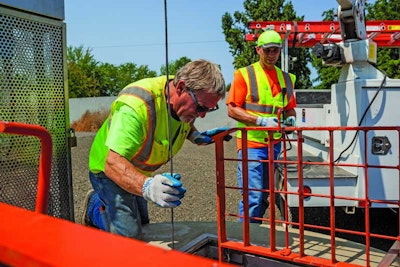
Interested in Cleaning?
Get Cleaning articles, news and videos right in your inbox! Sign up now.
Cleaning + Get AlertsIf there’s one thing that stands out about Thomas Nigh, says his boss, it’s Nigh’s attention to detail.
But that’s only the beginning. Nigh’s track record with the Roseburg Urban Sanitary Authority in Roseburg, Oregon, is so strong that in 2014 and again in 2015, he was recognized as Collections Operator of the Year for the Umpqua Basin Operators Section of the Pacific Northwest Clean Water Association.
“I consider Thomas my biggest asset here because of what he brings to the table,” says Steve Lusch, Nigh’s supervisor at the authority.
That may be particularly remarkable because Nigh’s been with the authority for just eight years, although he has worked in and around the field for much longer. “His talents are so varied,” marvels Lusch.
All the more so because of another fact: Nigh, 57, is dyslexic, which makes reading, writing and most kinds of detailed computer work difficult for him.
“Some people would consider that a disability,” Lusch says. “He’s never let it be that.”
Utility merger
The Roseburg Urban Sanitary Authority came into being in 1983 when three separate sanitary districts were combined to serve the city of about 30,000 people.
Authority employees maintain the collections system while a private contractor, Operations Management International (a unit of CH2M Hill), runs the authority’s treatment plant.
RUSA is funded strictly by collections fees. While the agency is just over 30 years old, its infrastructure is a lot older. RUSA’s 160 miles of sewer mains include some that date back a century. RUSA also takes care of nine lift stations in its system — eight owned by the authority and one privately owned but maintained by RUSA crews.
The sanitary authority’s customer base includes a mix of light industrial and residential users. The community appears to have become a magnet for retirees in recent years, and with them has come an influx of senior citizen homes and communities, he adds.
A hospital and a major dairy plant are part of the industrial mix, each adding their own distinctive challenges to the process of managing and treating sanitary waste. Microbreweries and wineries have started to crop up as well.
Cleaning and maintenance
RUSA has had a systematic line-cleaning program in place for as long as Lusch has been with the authority — going on two decades now. The entire system is cleaned over a three-year cycle, in keeping with EPA guidance; crews tackle about a third of the lines every year. Lines with special problems may be cleaned more often.
“As the crews are cleaning, we observe what kinds of stuff we’re bringing back,” Lusch says. When it comes across specific chronic cleaning problems that might be related to discharges in a particular area of town, the authority reaches out to businesses that are believed to be the source of that particular mess.
While the line-cleaning procedures have maintained a status quo, other maintenance practices have been tightened up.
Ratcheting up standards
About two years ago RUSA implemented a more frequent rotation of CCTV sewer inspections across the system. That came after the agency began paying closer attention to the sites of sanitary sewage overflows caused by inflow and infiltration, often exacerbated by root penetration into the line. As part of the analysis, crews reviewed when each overflow site had last been inspected. Not recently enough was often the conclusion. That changed.
“We used to have a 10-year cycle, which we never met,” Lusch admits. “We’ve put more of an emphasis on that.” So much so that even with the faster seven-year rotation schedule, “We’re actually beating that.”
TV inspection is important for combating problems such as root growth, he points out, because it can show what’s being missed during simple cleaning. “For roots, for example, you can run a jet nozzle up through the line and bring it back — but you don’t kill off the roots.”
Lift station problems
The new, shorter CCTV cycle isn’t the only change. “We’re cleaning our lift stations a lot more often,” Lusch says. In the past, stations would get cleaned as conditions demanded, but about five years ago RUSA decided to implement a schedule.
The added attention on the lift stations is the result of increased awareness of the damage from so-called “flushable wipes” clogging lift station pumps, he explains, as well as recurring problems with fats, oils and grease.
In addition to routine visits to each lift station every week, crews give each a deep cleaning once a year, draining the wet well and removing all debris. All the stations also get an annual drawdown test to check how well their pumps are performing. And the lift stations that are on sewer lines dominated by sources of FOG get visited once a quarter for cleaning.
But Roseburg doesn’t just rely on its own efforts to reduce clogs from wipes and FOG. The utility has also mounted a public education program, operating information booths at one or two community events each year to distribute handouts on the problems. “We show videos of the results of what happens” when things go in the toilet that shouldn’t, whether wipes, FOG or other material, Lusch adds.
And while the authority has its eye on possibly acquiring chopper pumps in the future that mechanically break up wipes so they don’t cause clogs, it won’t rush things. “The pumps are not cheap, for one thing,” he notes.
Focus on rehab
RUSA management and its board of directors have been striving to stay on top of major rehabilitation and repairs.
Lusch estimates the authority spends about $500,000 a year on “just rehab work,” with additional funds set aside for smaller repair jobs. A lot of the bigger work entails repairing or replacing heavily damaged lines where the worst I&I problems prevail.
For those jobs, RUSA mixes open-trench replacement with lining and pipe bursting technologies, depending on what looks most suitable for the particular situation. For example, the work has been all open trench so far in 2015 because the repairs targeted for the year entail not just eliminating leaks but also redirecting the flow and depth of sewer lines.
When open-cut replacement isn’t necessary, the agency has used Insituform lining solutions and HDPE pipe bursting products as well.
The crews tackle all these jobs with two combination jet/vac trucks: a 2005 Super Products Camel and a 2014 Aquatech B-6 (Hi-Vac Corporation). RUSA also employs an Envirosight CCTV camera supported by a 2005 Sprinter CCTV van; a rodder and bucket machine; a complement of six Ford and Chevrolet trucks for service and inspection; a pair of dump trucks; and a Caterpillar 415B backhoe. For its sewer camera database the authority uses WinCan 8, and its asset management platform uses Lucity software.
Man for all seasons
For Nigh, RUSA has been a good fit. The feeling is mutual.
“I’ve always enjoyed working in dirt, and I’ve worked for the Public Works field for 17 years,” Nigh says. “I enjoy working outside and doing sewer work more than anything.”
A good day for him is “just coming in and finding out what needs to be done, looking at the problem and communicating it with the guys, and just going and getting it done,” he says.
Nigh joined the authority as a Collections I worker in 2007, and his strong leadership skills became apparent almost immediately.
“Early on I could see that Thomas really pays close attention to detail,” Lusch says. “We would go out and I could give Thomas any job to do, and he would be able to schedule it and run people.”
Nigh also demonstrates strong communication skills — perhaps a bit ironic considering his challenges with written communication. “We have three or four generations here, and he can communicate with all different generations,” Lusch says.
Nigh’s approach to the task at hand fits right in with Lusch’s priorities. “He really strives to do a very good job. I’d rather see quality work than quantity work — we’d rather do it right the first time, and that’s his approach, too.”
Fast riser, quick study
After just two years with RUSA, Nigh moved up to Collections II leadman in 2009. “He just showed me that he could lead and do a good job of it,” Lusch says.
The same degree of care he takes with each assignment extends to the people under his direction. “He’s a very safe individual,” Lusch says. “If it’s not safe, it’s not going to get done. Since he took over that position in 2009, we haven’t had one lost-time accident, because he pays attention and he’s always on the ball.”
“You don’t want anybody getting hurt,” says Nigh. “It’s a really sick feeling. You prevent it by stopping, slowing down and checking things out. If it takes five hours longer to make it fit, then it does.”
Nigh’s experience has helped him learn how to take safe shortcuts with technology. It’s also prepared him for all manner of assignments, like his design and direction of the construction of a special 5-acre terraced wetland on a piece of RUSA property, where treated effluent is pumped as part of the treatment process.
Without Nigh there, “It would have probably cost us about a hundred grand,” says Lusch. “And we did it with our own people.”
The project also included construction of a weir to measure the flow leaving the property. And whatever challenges he might have had with reading and writing, Nigh wasn’t taken aback by the construction drawings.
Lusch had studied the plans himself and showed them to Nigh. “Thomas looked at them one time, went home and thought about them, and came in and built it perfectly,” Lusch says.
Nigh has two grown sons, 29 and 30, and a daughter, 35, and all of them work in some aspect of the building and construction trades. And for relaxation, Nigh himself can’t seem to get enough of the work. “I like fixing up homes,” he says. “I remodel them, from plumbing to sheetrock to framing — anything that has to do with just staying busy.”
For his boss, however, even more important than all of Nigh’s well-honed skills is his high integrity.
“I don’t know if I’ve met another person who has a work ethic like he does,” Lusch says. “I know if he tells me something it’s going to be the truth.”
Accommodating dyslexia
While Thomas Nigh’s skills and work ethic have earned him the appreciation of his supervisor and the 2014 Oregon Collections Operator of the Year award, his dyslexia hasn’t always made life easy.
According to Mayo Clinic in Rochester, Minnesota, dyslexia is a result of problems a person has relating the sound of speech to the appearance of letters and words on the page.
“Dyslexia occurs in children with normal vision and intelligence,” states Mayo’s description of the condition, posted on the clinic’s website. “Sometimes dyslexia goes undiagnosed for years and isn’t recognized until adulthood.”
Although there’s no cure, special tutoring and specialized education can help people with the condition succeed.
Steve Lusch, Nigh’s supervisor at the Roseburg Urban Sanitary Authority in Oregon, agrees that Nigh’s strengths — his ability to listen and communicate with a team of co-workers who span four generations, as well as his attention to detail and painstaking care — could be an accommodation on Nigh’s part for the inborn difficulty dyslexia causes.
Both the state and RUSA have found ways to accommodate the condition so that Nigh can maximize his strengths.
When Nigh needed to pass his Oregon Wastewater Collections Grade III Certification exam, a state Department of Environmental Quality representative came to the facility and conducted the exam orally, reading Nigh the questions and then letting him relate his answers.
“He didn’t have any problems passing that certification test, either,” Lusch says.







